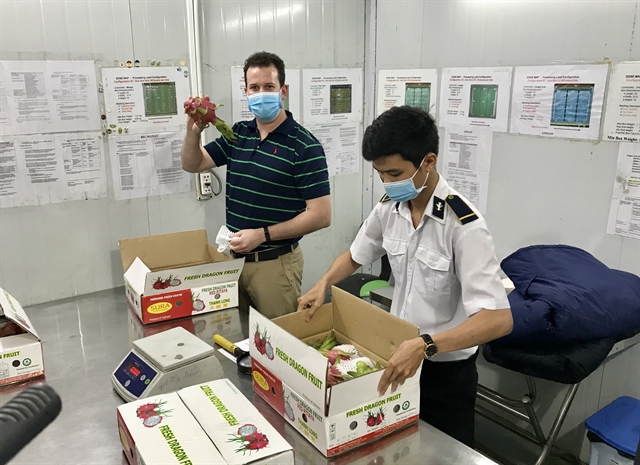 Economy
Economy


|
| Inspection of dragon fruit by the US Animal and Plant Health Inspection Service at the Sơn Sơn Irradiation Company in HCM City’s Bình Tân District. VNS Photo Bồ Xuân Hiệp |
HCM CITY — Vietnamese enterprises must be well prepared for legal issues if they seek to export to the US market, a seminar heard in HCM City last week.
Trần Phú Lữ, deputy director of the Investment and Trade Promotion Centre of HCM City (ITPC), said the US is Việt Nam’s largest export market and major items include seafood, textiles, footwear, and farm produce.
“The US is the largest market in the world with more than 328 million people and a per capita income of US$65,760.”
Vietnamese goods enjoy high profit margins in the US, which also has a diverse range of demand from high-tech products to affordable consumers goods, dovetailing with the strengths of Vietnamese enterprises, he said.
But it is also a highly demanding market, he said.
Vietnamese exports to the US are expected to face anti-dumping lawsuits and trade remedies, he added.
As of the end of last year there were 193 trade remedy cases involving investigations by the US into Vietnamese exports, including 108 anti-dumping cases, 22 anti-subsidy cases, 23 cases of tax evasion, and others.
The majority of Vietnamese goods subject to investigation are those that enjoy competitive advantages including metals, fibre, aquatic products, plywood, construction materials, and chemicals.
Diệp Quốc Kế, CEO of ASIA Golden Link INC, said Vietnamese businesses need to respond to the US’s trade remedies by learning about the laws of that country.
“They must understand and constantly keep abreast of the US legal system. In addition to federal law, there are separate laws for each state. In addition, it is important to understand trading partners to avoid high-risk transactions.”
C. Matthew Schulz, attorney at Dentons US LLP law firm, said periodically and for various partners the US adjusts its trade policies to protect the interests of its businesses.
It tends to target countries with large trade surpluses, and imports that grow rapidly increase face the risk of lawsuits and trade remedies, he said.
It has strict policies with regard to origin fraud and trade evasion, and so Vietnamese businesses need to be cautious and transparent about traceability information and should accurately classify their goods when exporting to the US, he added.
Trade remedies, including anti-dumping, anti-subsidy and safeguarding measures are allowed under free trade deals and World Trade Organization rules to prevent unfair competition. — VNS




